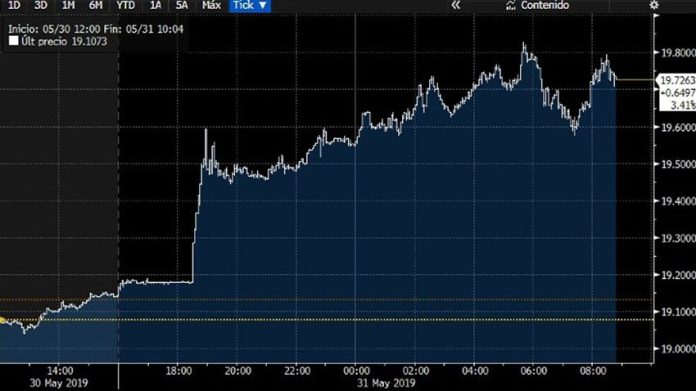The peso plunged more than 3% today on the news that United States President Donald Trump will impose a 5% tariff on all Mexican imports in order to pressure Mexico to do more to curb migration.
Banks were selling one U.S. dollar for 20.05 pesos, the newspaper El Financiero reported this morning, a 3.1% increase compared to a high yesterday of 19.45 pesos.
The interbank dollar rate also fell, dropping 3.1% to 19.74 pesos compared to 19.14 pesos at 4:00pm Thursday. The peso’s decline is the largest in seven months.
The Financial Times reported that in early London trading the currency fell 3.3% against the dollar. If the decline exceeds 3.5%, it would be the peso’s worst daily performance since Trump was elected in November 2017, when it tumbled 7.7%.
The U.S. president said the new universal tariff will apply to all Mexican imports from June 10 and increase by an additional 5% at the start of each following month until a cap of 25% is reached in October.
The tariffs will only be removed “if the illegal migration crisis is alleviated through effective actions taken by Mexico,” Trump said.
“Given the specific and near-term implementation date the president cites, we believe at least the first tariff at 5% is likely to be implemented as stated,” Goldman Sachs analysts said.
“That said, we note that another of the president’s proposed immigration actions – closing the U.S.-Mexico border – was threatened but never implemented.”
President López Obrador called for “prudence and responsibility” in a letter to Trump, stating that “social problems are not solved with taxes or coercive measures.”
A delegation led by Foreign Secretary Marcelo Ebrard is traveling to Washington D.C. today to meet with United States officials and, according to the president, “arrive at an agreement that benefits both nations.”
Ebrard said on Twitter that “the treatment of Mexico is unfair and doesn’t make economic sense for anybody.”
He added that the United States receives essential goods and services from Mexico and charged that migration flows from Central America and high drug consumption levels in the U.S. “are not the responsibility of Mexico.”
Source: El Financiero (sp), Financial Times (en)
